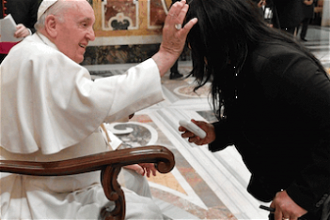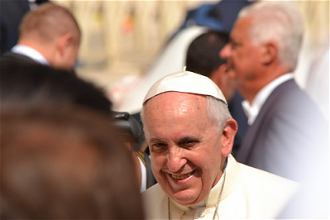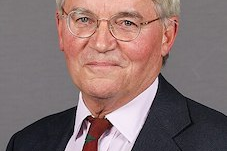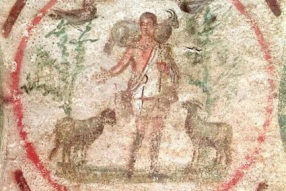Pope's message for World Day of the Sick
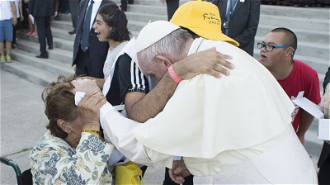
Pope Francis greets the sick during his visit to Chile in 2019
Source: Vatican News
"Come to me, all you who labour and are burdened" is the theme of the 28th World Day of the Sick, which will be marked on 11 February, the Feast of Our Lady of Lourdes.
In his message for the day, Pope Francis encourages all healthcare professionals, workers and volunteers to follow the human warmth and personalized approach of Christ, the Good Samaritan.
The mercy and comforting presence of Jesus, he says, embraces people in their entirety, regardless of their condition, discarding no one, but rather inviting everyone to share in His life and to experience His tender love.
The Pope explains that Jesus does so because He Himself became frail, endured human suffering and received comfort from His Father. Only those who personally experience suffering, the Pope argues, are able to comfort others.
The Pope notes that sometimes human warmth is lacking in our approach to those suffering incurable and chronic diseases, psychological diseases, situations calling for rehabilitation or palliative care, numerous forms of disability, children's or geriatric diseases… "What is needed is a personalized approach to the sick, not just of curing but also of caring, in view of an integral human healing."
In addition to therapy and support, he says, they expect care and attention - "In a word, love". "At the side of every sick person, there is also a family, which itself suffers and is in need of support and comfort."
Those who are sick, the Pope says, attract the eyes and heart of Jesus. "Christ did not give us prescriptions, but through His passion, death and resurrection He frees us from the grip of evil." In this regard, he says, "The Church desires to become more and more the "inn" of the Good Samaritan who is Christ, that is, a home where you can encounter His grace, which finds expression in closeness, acceptance and relief."
The Holy Father acknowledges the key role that healthcare workers, such as physicians, nurses, medical and administrative professionals, assistants and volunteers play in caring for the sick. As men and women with their own frailties and illnesses, these healthcare workers show how true it is that "once Christ's comfort and rest is received, we are called in turn to become rest and comfort for our brothers and sisters".
In serving the ill, Pope Francis urges healthcare professionals that "the noun 'person' takes priority over the adjective 'sick'. He urges them to "always strive to promote the dignity and life of each person, and reject any compromise in the direction of euthanasia, assisted suicide or suppression of life, even in the case of terminal illness."
"Let us remember that life is sacred and belongs to God," he says; "hence it is inviolable and no one can claim the right to dispose of it freely." "Life must be welcomed, protected, respected and served from its beginning to its end: both human reason and faith in God, the author of life, require this."
"In some cases," the Pope points out, "conscientious objection becomes a necessary decision if you are to be consistent with your "yes" to life and to the human person," thus "safeguarding of the truest human right, the right to life". "When you can no longer provide a cure, you will still be able to provide care and healing, through gestures and procedures that give comfort and relief to the sick.
Pope Francis laments that during wars and violent conflicts, healthcare professionals and facilities are attacked, and in some areas, political authorities attempt to manipulate medical care for their own advantage, thus restricting the medical profession's legitimate autonomy.
Noting that many across the world have "no access to medical care because they live in poverty," the Pope urges healthcare institutions and government leaders not to neglect social justice.
The Holy Father concludes his message thanking all healthcare volunteers who serve the sick, often compensating for structural shortcomings, while reflecting the image of Christ, the Good Samaritan, by their acts of tender love and closeness.
Commenting on the letter, Archbishop Vincenzo Paglia, president of the Vatican's Pontifical Academy for Life, said it was dealing with an issue that has an increasingly inter-religious and even secular dimension.
In an interview with Vatican Radio, he noted that in October, representatives of the Abrahamic monotheistic religions gave the Pope a signed common document, which condemned euthanasia and assisted suicide, and encouraged accompanying the sick and palliative care everywhere and for everyone.
Around the same time, he said, a secular institution like the World Medical Association, also expressed its stand against euthanasia and assisted suicide. This because a doctor's conscience is formed to heal, not to kill, he said.
Archbishop Paglia said the Pope calls for a personalized approach to the sick, not just of curing but also of caring - an integral human healing. Even when we cannot heal, the fundamental action is to remain close to the sick, never abandoning them, especially those in the most difficult or weakest situations.




